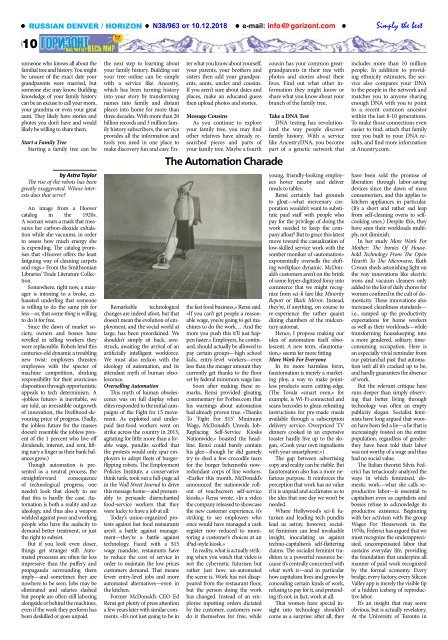Горизонт 38/963
Горизонт (газета) — (Gorizont англ. Horizon ) первая и наиболее влиятельная газета, издающаяся на русском языке в штатеКолорадо, США. Еженедельник, выходит по пятницам, формат Таблоид, 128 цветных и чернобелых страниц, распространяется в городах, составляющих метрополию Денвера (Большой Денвер), и в других населенных пунктах штата Колорадо от графства Саммит до графства Эль—Пасо. Полная электронная версия газеты «Горизонт» доступна в сети Интернет. Подробнее http://en.wikipedia.org/wiki/Gorizont_(newspaper)
Горизонт (газета) — (Gorizont англ. Horizon ) первая и наиболее влиятельная газета, издающаяся на русском языке в штатеКолорадо, США. Еженедельник, выходит по пятницам, формат Таблоид, 128 цветных и чернобелых страниц, распространяется в городах, составляющих метрополию Денвера (Большой Денвер), и в других населенных пунктах штата Колорадо от графства Саммит до графства Эль—Пасо. Полная электронная версия газеты «Горизонт» доступна в сети Интернет. Подробнее http://en.wikipedia.org/wiki/Gorizont_(newspaper)
You also want an ePaper? Increase the reach of your titles
YUMPU automatically turns print PDFs into web optimized ePapers that Google loves.
RUSSIAN DENVER / HORIZON<br />
10<br />
N<strong>38</strong>/<strong>963</strong> от 10.12.2018 e-mail: info@gorizont.com Simply the best<br />
someone who knows all about the<br />
familial tree and history. You might<br />
be unsure of the exact date your<br />
grandparents were married, but<br />
someone else may know. Building<br />
knowledge of your family history<br />
can be an excuse to call your mom,<br />
your grandma or even your great<br />
aunt. They likely have stories and<br />
photos you don’t have and would<br />
likely be willing to share them.<br />
Start a Family Tree<br />
Starting a family tree can be<br />
by Astra Taylor<br />
The rise of the robots has been<br />
greatly exaggerated. Whose interests<br />
does that serve?<br />
An image from a Hoover<br />
catalog in the 1920s.<br />
A woman wears a mask that measures<br />
her carbon-dioxide exhalation<br />
while she vacuums, in order<br />
to assess how much energy she<br />
is expending. The catalog promises<br />
that «Hoover offers the least<br />
fatiguing way of cleaning carpets<br />
and rugs.» From the Smithsonian<br />
Libraries’ Trade Literature Collection.<br />
Somewhere, right now, a manager<br />
is intoning to a broke, exhausted<br />
underling that someone<br />
is willing to do the same job for<br />
less—or, that some thing is willing<br />
to do it for free.<br />
Since the dawn of market society,<br />
owners and bosses have<br />
revelled in telling workers they<br />
were replaceable. Robots lend this<br />
centuries-old dynamic a troubling<br />
new twist: employers threaten<br />
employees with the specter of<br />
machine competition, shirking<br />
responsibility for their avaricious<br />
disposition through opportunistic<br />
appeals to tech determinism. A<br />
«jobless future» is inevitable, we<br />
are told, an irresistible outgrowth<br />
of innovation, the livelihood-devouring<br />
price of progress. (Sadly,<br />
the jobless future for the masses<br />
doesn’t resemble the jobless present<br />
of the 1 percent who live off<br />
dividends, interest, and rent, lifting<br />
nary a finger as their bank balances<br />
grow.)<br />
Though automation is presented<br />
as a neutral process, the<br />
straightforward consequence<br />
of technological progress, one<br />
needn’t look that closely to see<br />
that this is hardly the case. Automation<br />
is both a reality and an<br />
ideology, and thus also a weapon<br />
wielded against poor and working<br />
people who have the audacity to<br />
demand better treatment, or just<br />
the right to subsist.<br />
But if you look even closer,<br />
things get stranger still. Automated<br />
processes are often far less<br />
impressive than the puffery and<br />
propaganda surrounding them<br />
imply—and sometimes they are<br />
nowhere to be seen. Jobs may be<br />
eliminated and salaries slashed<br />
but people are often still laboring<br />
alongside or behind the machines,<br />
even if the work they perform has<br />
been deskilled or goes unpaid.<br />
Remarkable technological<br />
changes are indeed afoot, but that<br />
doesn’t mean the evolution of employment,<br />
and the social world at<br />
large, has been preordained. We<br />
shouldn’t simply sit back, awestruck,<br />
awaiting the arrival of an<br />
artificially intelligent workforce.<br />
We must also reckon with the<br />
ideology of automation, and its<br />
attendant myth of human obsolescence.<br />
Overselling Automation<br />
This myth of human obsolescence<br />
was on full display when<br />
elites responded to the initial campaigns<br />
of the Fight for 15 movement.<br />
As exploited and underpaid<br />
fast-food workers went on<br />
strike across the country in 2013,<br />
agitating for little more than a livable<br />
wage, pundits scoffed that<br />
the protests would only spur employers<br />
to adopt fleets of burgerflipping<br />
robots. The Employment<br />
Policies Institute, a conservative<br />
think tank, took out a full-page ad<br />
in the Wall Street Journal to drive<br />
this message home—and presumably<br />
to persuade disenchanted<br />
food-service workers that they<br />
were lucky to have a job at all:<br />
Today’s union-organized protests<br />
against fast food restaurants<br />
aren’t a battle against management—they’re<br />
a battle against<br />
technology. Faced with a $15<br />
wage mandate, restaurants have<br />
to reduce the cost of service in<br />
order to maintain the low prices<br />
customers demand. That means<br />
fewer entry-level jobs and more<br />
automated alternatives—even in<br />
the kitchen.<br />
Former McDonald’s CEO Ed<br />
Rensi got plenty of press attention<br />
a few years later with similar comments.<br />
«It’s not just going to be in<br />
the next step to learning about<br />
your family history. Building out<br />
your tree online can be simple<br />
with a service like Ancestry,<br />
which has been turning history<br />
into your story by transforming<br />
names into family and distant<br />
places into home for more than<br />
three decades. With more than 20<br />
billion records and 3 million family<br />
history subscribers, the service<br />
provides all the information and<br />
tools you need in one place to<br />
make discovery fun and easy. Enter<br />
what you know about yourself,<br />
your parents, your brothers and<br />
sisters then add your grandparents,<br />
aunts, uncles and cousins.<br />
If you aren’t sure about dates and<br />
places, make an educated guess<br />
then upload photos and stories.<br />
Message Cousins<br />
As you continue to explore<br />
your family tree, you may find<br />
other relatives have already researched<br />
pieces and parts of<br />
your family tree. Maybe a fourth<br />
The Automation Charade<br />
the fast food business,» Rensi said.<br />
«If you can’t get people a reasonable<br />
wage, you’re going to get machines<br />
to do the work… And the<br />
more you push this it’ll just happen<br />
faster.» Employers, he continued,<br />
should actually be allowed to<br />
pay certain groups—high school<br />
kids, entry-level workers—even<br />
less than the meager amount they<br />
currently get thanks to the floor<br />
set by federal minimum wage law.<br />
Soon after making these remarks,<br />
Rensi provided gloating<br />
commentary for Forbes.com that<br />
his warnings about automation<br />
had already proven true. «Thanks<br />
To ‘Fight For $15’ Minimum<br />
Wage, McDonald’s Unveils Job-<br />
Replacing Self-Service Kiosks<br />
Nationwide,» boasted the headline.<br />
Rensi could barely contain<br />
his glee—though he did gamely<br />
try to shed a few crocodile tears<br />
for the burger behemoth’s nowredundant<br />
corps of line workers.<br />
«Earlier this month, McDonald’s<br />
announced the nationwide rollout<br />
of touchscreen self-service<br />
kiosks,» Rensi wrote. «In a video<br />
the company released to showcase<br />
the new customer experience, it’s<br />
striking to see employees who<br />
once would have managed a cash<br />
register now reduced to monitoring<br />
a customer’s choices at an<br />
iPad-style kiosk.»<br />
In reality, what is actually striking<br />
when you watch that video is<br />
not the cybernetic futurism but<br />
rather just how un-automated<br />
the scene is. Work has not disappeared<br />
from the restaurant floor,<br />
but the person doing the work<br />
has changed. Instead of an employee<br />
inputting orders dictated<br />
by the customer, customers now<br />
do it themselves for free, while<br />
cousin has your common greatgrandparents<br />
in their tree with<br />
photos and stories about their<br />
lives. Find out what other information<br />
they might know or<br />
share what you know about your<br />
branch of the family tree.<br />
Take a DNA Test<br />
DNA testing has revolutionized<br />
the way people discover<br />
family history. With a service<br />
like AncestryDNA, you become<br />
part of a genetic network that<br />
young, friendly-looking employees<br />
hover nearby and deliver<br />
meals to tables.<br />
Rensi certainly had grounds<br />
to gloat—what mercenary corporation<br />
wouldn’t want to substitute<br />
paid staff with people who<br />
pay for the privilege of doing the<br />
work needed to keep the company<br />
afloat? But to grace this latest<br />
move toward the casualization of<br />
low-skilled service work with the<br />
somber moniker of «automation»<br />
exponentially oversells the shifting<br />
workplace dynamic. McDonald’s<br />
customers aren’t on the brink<br />
of some hyper-digitized foray into<br />
commerce that we might recognize<br />
from sci-fi fare like Minority<br />
Report or Black Mirror. Instead,<br />
they’re, if anything, on course to<br />
re-experience the rather quaint<br />
dining chambers of the midcentury<br />
automat.<br />
Hence, I propose making our<br />
idea of automation itself obsolescent.<br />
A new term, «fauxtomation,»<br />
seems far more fitting.<br />
More Work For Everyone<br />
In its more harmless form,<br />
fauxtomation is merely a marketing<br />
ploy, a way to make pointless<br />
products seem cutting-edge.<br />
(The Tovala «smart oven,» for<br />
example, is Wi-Fi-connected and<br />
scans barcodes to glean reheating<br />
instructions for pre-made meals<br />
available through a subscription<br />
delivery service. Overpriced TV<br />
dinners cooked in an expensive<br />
toaster hardly live up to the slogan,<br />
«Cook your own ingredients<br />
with your smartphone.»)<br />
The gap between advertising<br />
copy and reality can be risible. But<br />
fauxtomation also has a more nefarious<br />
purpose. It reinforces the<br />
perception that work has no value<br />
if it is unpaid and acclimates us to<br />
the idea that one day we won’t be<br />
needed.<br />
Where Hollywood’s sci-fi futurism<br />
and leading tech pundits<br />
lead us astray, however, socialist<br />
feminism can lend invaluable<br />
insight, inoculating us against<br />
techno-capitalism’s self-flattering<br />
claims. The socialist feminist tradition<br />
is a powerful resource because<br />
it’s centrally concerned with<br />
what work is—and in particular<br />
how capitalism lives and grows by<br />
concealing certain kinds of work,<br />
refusing to pay for it, and pretending<br />
it’s not, in fact, work at all.<br />
That women have special insight<br />
into technology shouldn’t<br />
come as a surprise: after all, they<br />
includes more than 10 million<br />
people. In addition to providing<br />
ethnicity estimates, the service<br />
also compares your DNA<br />
to the people in the network and<br />
matches you to anyone sharing<br />
enough DNA with you to point<br />
to a recent common ancestor<br />
within the last 8-10 generations.<br />
To make those connections even<br />
easier to find, attach that family<br />
tree you built to your DNA results,<br />
and find more information<br />
at Ancestry.com.<br />
have been sold the promise of<br />
liberation through labor-saving<br />
devices since the dawn of mass<br />
consumerism, and this applies to<br />
kitchen appliances in particular.<br />
(It’s a short and rather sad leap<br />
from self-cleaning ovens to selfcooking<br />
ones.) Despite this, they<br />
have seen their workloads multiply,<br />
not diminish.<br />
In her study More Work For<br />
Mother: The Ironies Of Household<br />
Technology From The Open<br />
Hearth To The Microwave, Ruth<br />
Cowan sheds astonishing light on<br />
the way innovations like electric<br />
irons and vacuum cleaners only<br />
added to the list of daily chores for<br />
women confined in the cult of domesticity.<br />
These innovations also<br />
increased cleanliness standards—<br />
i.e., ramped up the productivity<br />
expectations for home workers<br />
as well as their workloads—while<br />
transforming housekeeping into<br />
a more gendered, solitary, timeconsuming<br />
occupation. Here is<br />
an especially vivid reminder from<br />
our patriarchal past that automation<br />
isn’t all it’s cracked up to be,<br />
and hardly guarantees the absence<br />
of work.<br />
But the relevant critique here<br />
runs deeper than simply observing<br />
that better living through<br />
technology was often an empty<br />
publicity slogan. Socialist feminists<br />
have long argued that women<br />
have been fed a lie—a lie that is<br />
increasingly foisted on the entire<br />
population, regardless of gender:<br />
they have been told their labor<br />
was not worthy of a wage and thus<br />
had no social value.<br />
The Italian theorist Silvia Federici<br />
has tenaciously analyzed the<br />
ways in which feminized, domestic<br />
work—what she calls reproductive<br />
labor—is essential to<br />
capitalism even as capitalists and<br />
bosses refuse to acknowledge its<br />
productive existence. Beginning<br />
with her activism with the group<br />
Wages For Housework in the<br />
1970s, Federici has argued that we<br />
must recognize the underappreciated,<br />
uncompensated labor that<br />
sustains everyday life, providing<br />
the foundation that underpins all<br />
manner of paid work recognized<br />
by the formal economy. Every<br />
bridge, every factory, every Silicon<br />
Valley app is merely the visible tip<br />
of a hidden iceberg of reproductive<br />
labor.<br />
It’s an insight that may seem<br />
obvious, but is actually revelatory.<br />
At the University of Toronto in
















